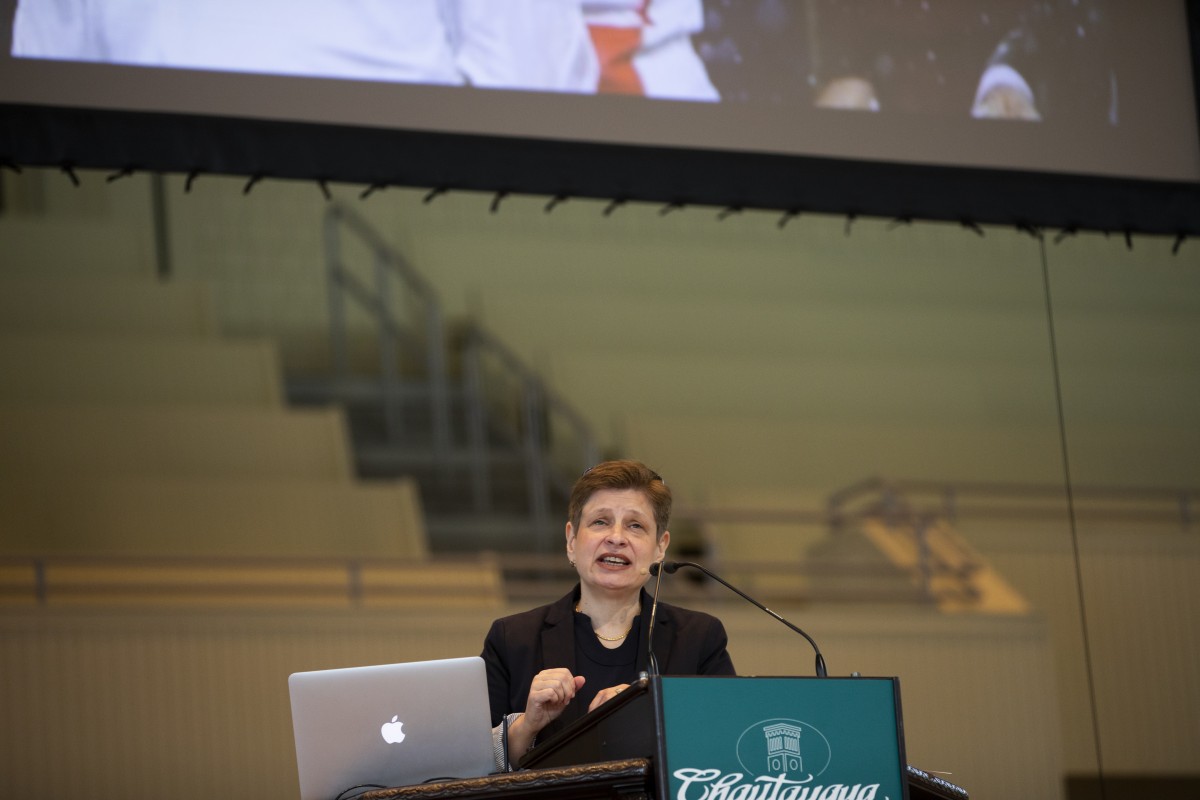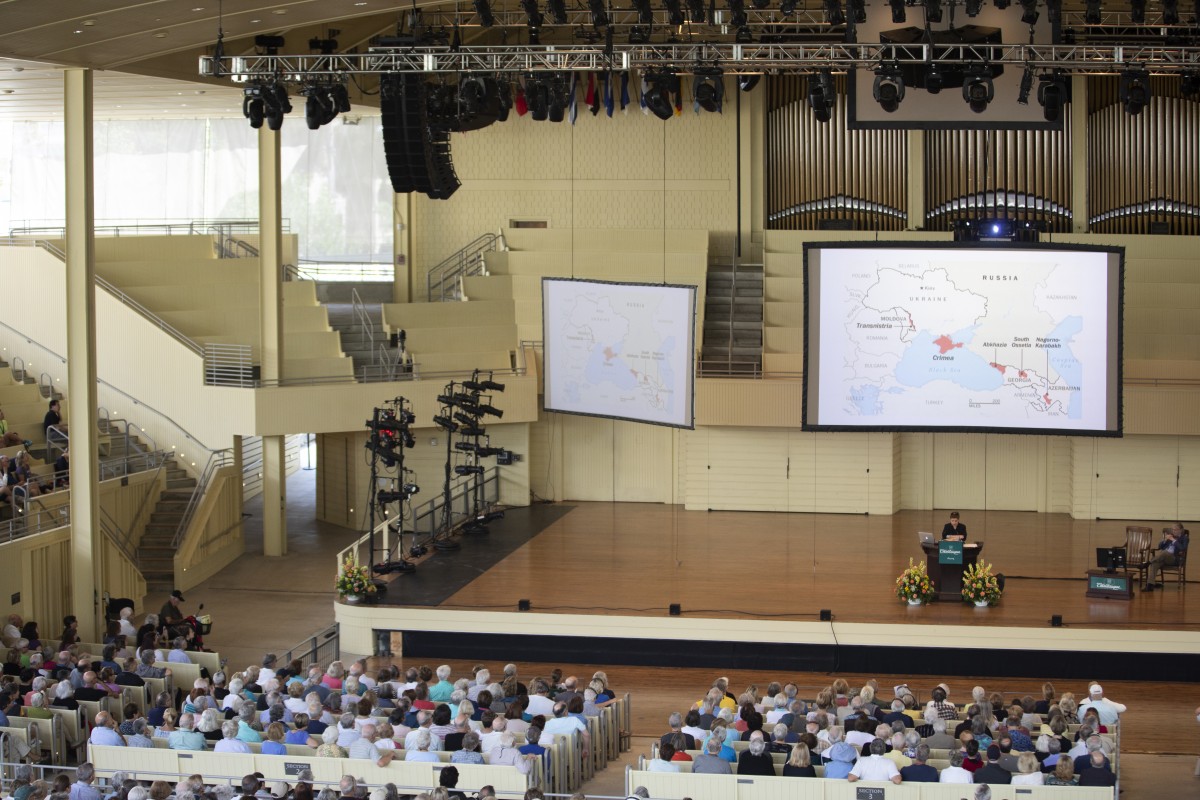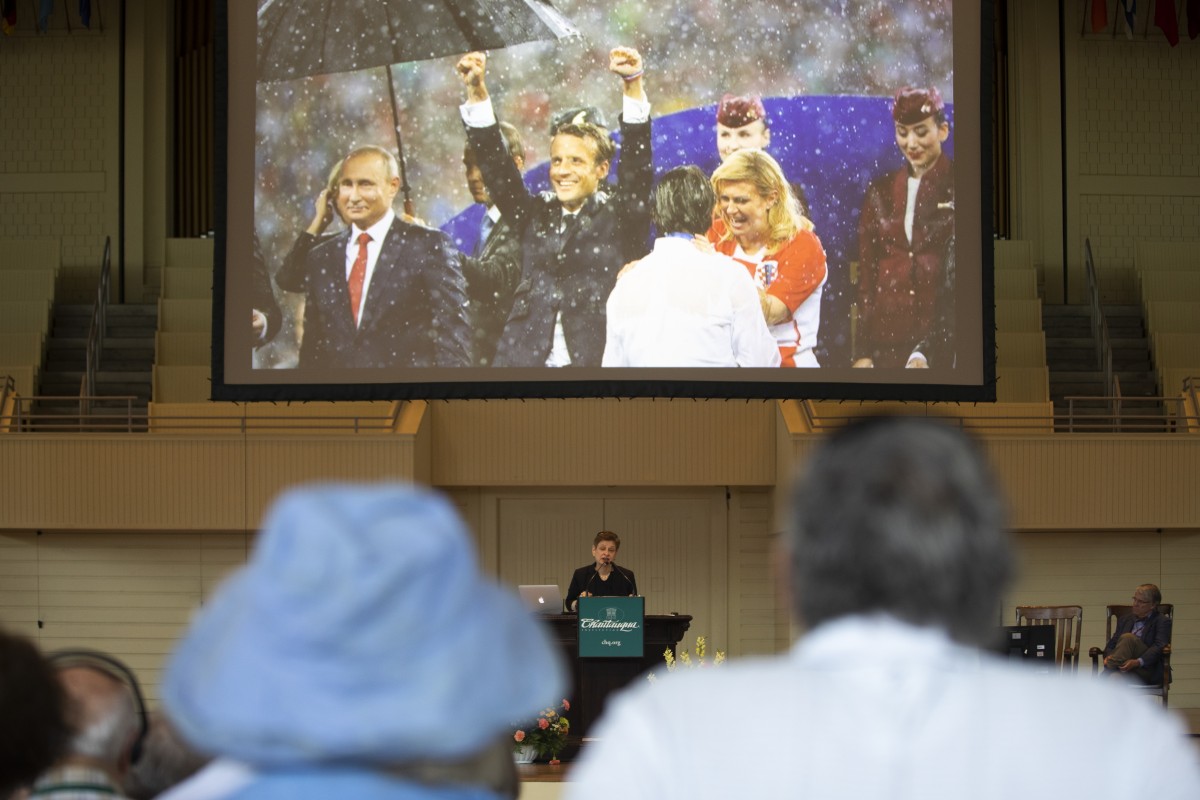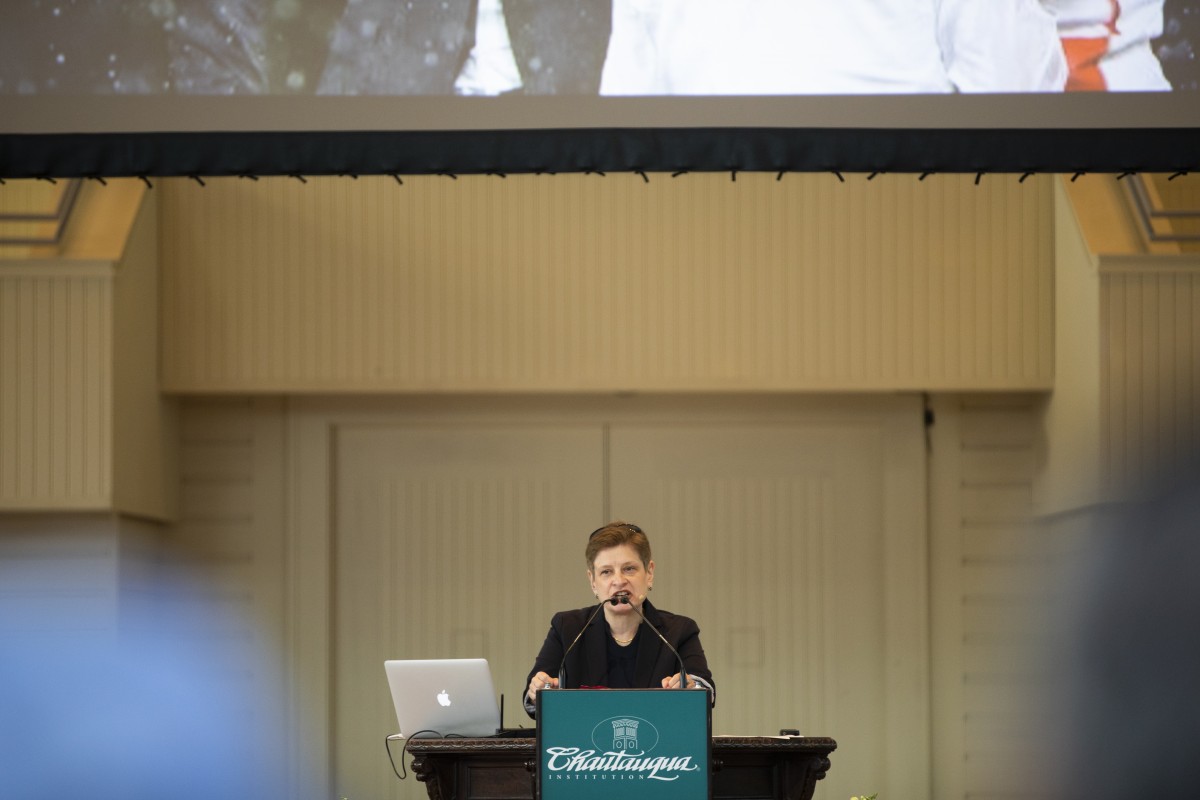President Boris Yeltsin left the Kremlin in 1999, leaving a vacant office and a hungry Vladimir Putin. After his landslide victory for the presidency, Putin, determined to show a unified, powerful Russia, set out to travel all of the country’s 11 time zones on New Year’s Eve — a Russian Santa Claus, as Nina Khrushcheva described it.
Putin’s plan proved flawed, and he never delivered his intended hourly speeches through his vast country. Khrushcheva, however, picked up where he left off; her journey inspired her upcoming book In Putin’s Footsteps: Searching for the Soul of an Empire Across Russia’s Eleven Time Zones, and her 10:45 a.m. morning lecture Wednesday, July 18, in the Amphitheater.
Khrushcheva is a professor of international affairs at The New School in New York City, a senior fellow of the World Policy Institute and a member of the Council on Foreign Relations. She is an author, as well; her second book, The Lost Khrushchev: A Journey Into the Gulag of the Russian Mind, documents the history of former Soviet premier Nikita Khrushchev, her biological great-grandfather and adoptive grandfather, and his oldest son, Leonid.
She opened her lecture with technical difficulties — the projector malfunctioned, causing Khrushcheva to gesture to a blank screen behind her. She referred to the ordeal as another hacking attempt by Putin, making light of the situation. After a few moments, the display reappeared, and she recommenced her Week Four lecture on “Russia and the West.”
“This week’s topic, as we have mentioned a couple of times already, couldn’t have come at a better time,” she said, “even if the man of the hour, Vladimir Putin himself, would have arranged it.”
It can be difficult for the United States and Russia to view each other beyond the context of recent developments in Russia’s alleged meddling in the 2016 election, or the countries’ shared bleak, war-torn history, Khrushcheva said. For the United States, Putin is no more than a “villain,” she said, but in Russia — despite political and social corruption throughout his presidency — he has repaired infrastructure, and his people are rallying behind him.
“It has been over a quarter- century since the collapse of communism in 1991, but the U.S. has never quite stopped seeing it as a Cold War foe, and Russia itself often, and sometimes, prefers to be feared and not loved,” she said.
Her journey across Russia’s federal districts led her to dissect the attitudes of Russians, attempting to soften their perceived rugged behavior. She traveled from the far west, to a town bordering Eastern Europe, to the far east, on the border of Russia and Japan. While in the east, she stopped to “proudly wave at Sarah Palin,” she joked.
During this time, she observed three things about the country: Russia is “inherently incoherent;” it is defined by its past while longing for the future; and it is “homogeneous” despite its size and diverse regions and cultures.
Khrushcheva said U.S. foreign policy “should remember that Russia is not linear,” meaning that Russia holds tight to its narrative, rarely straying from its origins. She provided an example: an image (on a now working projector) of an emporium selling a portrait of Putin alongside the Russian Empire’s coat of arms — the double-headed eagle.
The double-headed eagle is a prominent and important symbol in Russia, she said. Originating in the Byzantine Empire in the 1450s, the image has since become standard for the Russian coat of arms throughout centuries. For Khrushcheva, the double-headed eagle represents the “split personality” of Russia.
Aside from Byzantine, Christian antiquity, Putin’s Russia has also preserved pieces from its communist past; a hammer and sickle sculpture sits outside a Joseph Stalin-era detention camp.
“That’s how Russia sees itself — all the way back in history,” she said.
Khrushcheva said Putin keeps these relics as “signs of great power.” She compared this to the preservation of Confederate flags and military statues in the American south.
In Russia, Putin has erected and maintained over 7,000 statues of Russian leaders, saints and inventors, including Stalin, Vladimir Lenin and Ivan III, better known as Ivan the Great.
While traveling, Khrushcheva stumbled upon a statue isolated in the center of a roundabout. The statue, despite having stairs leading up to it, is inaccessible by car and dangerous to approach by foot. Skateboarders, however, are able to make it to the island.
Khrushcheva followed a group of skateboarders to the statue, and eventually to a coffee shop appropriately named “New York Coffee.” As a New Yorker herself, she felt compelled to go in. On the menu was a drink ominously named “Trump.”
“I ordered the drink. I thought, ‘I want to know what a Trump drink is’ — it had this disgusting orange syrup on top of it,” she said over a roar of laughter. “It (had) little to do with coffee, as little as Trump has to do with (the) presidency. I asked the waitress if (the drink) was in awe or in mockery (of Trump). She said it was whatever you want. That’s that split personality.”
Khrushcheva turned back to the statues and what they mean to both men in both countries. She compared Trump’s towers to Putin’s statues. For Putin, “these statues essentially … are monuments to Putin himself.”
He commissions statues of strong leaders he strives to mirror, saints to show “God is on Russia’s side” and military giants to demonstrate Russia’s power. Trump built Trump Tower to show off his wealth and power and, Khrushcheva said, as free advertising.
Putin’s demonstration of his state’s military power through monuments, specifically that of Mikhail Kalashnikov, inventor of the AK-47, is evident of Putin’s paranoia of an international conspiracy against Russia, she said, its readiness for war, and Putin’s belief that he is “the protector of the motherland.”
“Russia celebrates the fact that it is culturally at war,” Khrushcheva said.
Khrushcheva continued to her last point: that Russia is a homogenous country despite economic, religious and geographic diversity.
“It is not a civilization, as Russians often say about themselves, but it is certainly a universe — it is a fortress of its own greatness,” she said.
On the screen flashed an image of Crimea and Vladivostok, a cosmopolitan city on the opposite side of Russia about 500 miles from Japan. The difference between the two is vast; however, Russia holds a firm grasp on Crimea as the key to its unified identity.
Russia claims Crimea to be its rightful territory because it was the location of the baptism of Vladimir I. Vladimir I was the grand prince of Kiev and is known as a prominent political figure in ancient Russia.
Khrushcheva read a sign painted on the side of a Vladivostok highway that was more telling: “The island — the Crimea island — is Russian, and Crimea is of Russian origins.”
“Just imagine,” she said, “a world apart, all of those time zones apart — you still have Crimea (completing) that fortress of greatness.”
For Khrushcheva, however, what makes Russia great is not the statues, the symbols, its power or its territories — it is the resilience of its people, which she said was evident when Russia hosted the World Cup earlier this month.
She began and ended her lecture with the World Cup, displaying photos of crowds gathered on the streets of Moscow and “alpha-male” Putin standing under an umbrella while other diplomats, including French President Emmanuel Macron, stood in the rain. According to Khrushcheva, Putin’s popularity has gone down since the World Cup because Russia’s people realized they don’t need the Kremlin or annexation to be great.
“During the World Cup, Russia didn’t launch any missiles, it didn’t take any territories, it didn’t stun the world with any new military initiatives, it didn’t show any new maps with potentially Florida,” she said. “Russia just followed the global rules for an international event and thus appeared for the world as a ‘regular country’ … and not a besieged fortress. This newly discovered globalism may prove challenging to Putin’s next years in power.”
After the conclusion of Khrushcheva’s lecture, Geof Follansbee, chief executive officer of the Chautauqua Foundation and Chautauqua Institution’s vice president of development, opened the Q-and-A.
He asked how this new “globalism” in Russia compared to the introduction of democracy after the Cold War.
“When Russia lost the Cold War, America was not a gracious winner. I’m really sorry, I hate to tell you that,” Khrushcheva said. “And so Americans came in and started telling Russians what to do and how to be. … At the time, Russians were willing to accept this teaching and lecturing, but one of the great appeals for Putin is that he said, ‘We’re not going to do it. Who are you to tell us what to do?’ … The Russians have had enough time since the Soviet time to grow into this democratization.”
Follansbee then opened the floor to questions from the audience. One attendee asked what Khrushcheva thought Putin’s biggest foreign policy mistake has been since his presidency began and what the Russian people think of his policies.
“Foreign policy is generally viewed favorably,” she said. “I think his mistake probably was the meddling (in the 2016 election). I don’t know if he would do it the same way this time around because he was warned that he would not be able to hide the Russian hand.”
To close the program, Follansbee asked if Khrushcheva if she could share some childhood memories of Nikita Khrushchev.
“It is wonderful to see Chautauqua and the beautiful nature and … I feel that, with sadness, it is wasted on me because when I was growing up, Khrushchev … was a great farmer. … And our chores would be to collect strawberries or do farming chores, and I think I started hating nature so much after that because I wanted to play,” she said. “And so now when I see a tree, I usually cross the street.”








